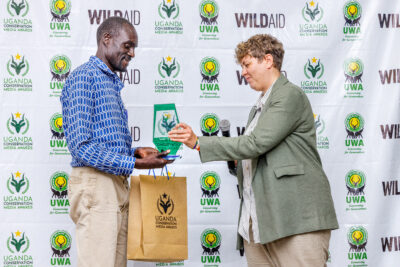
Uganda Wildlife Authority (UWA), in partnership with WildAid, hosted the second edition of the Uganda Conservation Media Awards on October 16, 2024, recognizing the critical role of the media in promoting wildlife conservation and raising public awareness on environmental issues.
The awards are the only of their kind in Africa and were established in 2023 to honor and recognize journalists who demonstrate excellence in conservation reporting.
“The media’s influence is essential in encouraging Ugandans to understand, appreciate, and act to protect our wildlife and natural resources,” said Minister of State for Tourism, Wildlife, and Antiquities Martin Mugarra Bahinduka in a keynote address at the awards ceremony.
Through these awards, UWA and WildAid seek to inspire and encourage more journalists to engage with conservation issues and to delve into those issues more deeply.
The aim is to ensure that stories of Uganda’s wildlife and ecosystems reach a wider audience and to raise awareness among the public and policymakers about Uganda’s rich biodiversity and the challenges it faces.
“Journalists have been instrumental in raising awareness about critical issues such as poaching, habitat degradation, and human-wildlife conflict,” UWA Executive Director Sam Mwandha told the media. “Your work helps bridge the gap between conservationists and the communities we serve.”
This second edition of the awards saw a significant increase in the quality of entries, highlighting the growing interest and engagement of journalists in conservation. The competition was tight, with submissions covering key topics such as poaching, human-wildlife conflict, and community-driven conservation efforts.
“The level of competition this year was extremely high, and it’s clear that more journalists are engaging deeply with conservation issues,” said Bashir Hangi, Uganda Wildlife Authority’s Communications Manager. “Their work is critical in shaping public opinion and promoting action.”
The winners of the second Uganda Conservation Media Awards were recognized across several categories:
– Wildlife Photograph of the Year: Raymond Kagumire – “Snared hartebeest”
– Wildlife Protection (Print/Online): Julius Luwemba – “Sgt. Adong drops gun after 35 years of protecting wildlife” (New Vision)
– Wildlife Protection (Radio): Victor Andama – “Reintroduction of white rhinos back to East Madi Wildlife Reserve” (Voice of Madi FM)
– Community Conservation (Print/Online): Okello Jesus Ojara and Dramadri Frederick – “How passionate community members rescued abandoned Ajai Wildlife Reserve” (TND News Uganda)
– Community Conservation (Radio): Wambi Michael – “Waking to the call of the elephant in Uganda” (Uganda Radio Network)
– Community Conservation (TV/Video): Immaculate Amony and Eddy Olwa – “Community action for human-wildlife conflict” (UBC TV)
– Wildlife Crime (Print/Online): Ronald Musoke – “Greatest elephant, pangolin massacre” (The Independent)
– Wildlife Crime (Radio): Benjamin Jumbe – “Kamasanyu the wildlife advocate” (KFM)
– Habitats & Environment (Print/Online): Richard Drasimaku – “The quest for the reintroduction of white rhinos in Ajai Wildlife Reserve” (West Nile News)
– Habitats & Environment (Radio): Chowoo Willy – “Whispers in the wilderness” (Choice FM)
– Habitats & Environment (TV/Video): Akiza Eli and Andrew Tushabe – “How climate change has affected birds in Lake Mburo National Park” (TV West/Vision Group)
For the first time, a further 13 entries received commendations, as the judges recognized the high quality of the submissions.
“From films that showcase the beauty and fragility of our ecosystems to radio pieces that educate and inspire people to make a change in their communities to in-depth journalism that holds agencies accountable; each of you has contributed something valuable. You have helped create a dialogue around wildlife conservation that resonates not only within Uganda but beyond its borders,” Maz Robertson, WildAid East Africa Representative, shared with the award winners.
“The power of media to influence behavior, to inspire people to take action, and to spread awareness is limitless,” she added. “As we move forward, let us continue to harness this power. Let us keep telling stories that matter, stories that will ensure that future generations inherit a world as rich and biodiverse as the one we enjoy today.”
Prof. James Kalema, Chairman of the UWA Board of Trustees, pledged continued support for the awards, noting the impressive quality of entries this year.
“The UWA Board remains committed to supporting this initiative, recognizing that media professionals play a key role in driving Uganda’s conservation efforts forward,” he said.
The awards ceremony drew media practitioners, conservation partners, and representatives from the tourism private sector.
“The aim of these awards is to give Ugandans a voice in their own futures and to stimulate informed debate about the pressing conservation challenges the country faces,” said Simon Denyer, Africa Program Manager at WildAid. “By reporting more accurately and more powerfully, and by promoting more accountability, journalists have a critical role to play.”
Stay in touch and get the latest WildAid updates.
SIGN UP